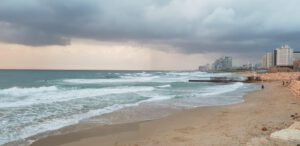Since I rushed back to Israel from a stay abroad, things were starting to look darker and darker. The current government is more corrupt than ever and they seem to be taking advantage of the crisis to destroy the remaining of democracy I didn’t even know we still had. One of the hardest parts for me when coming back were my first two weeks in obligatory isolation. I had to spend it at my parents‘ house, where the TV is constantly on, and I had to witness how the media is cooperating with the government on every issue, betraying us citizens for reasons I don’t even know.
At the same time, our beautiful group of Israeli participants from last year’s women’s* seminar decided that if we can’t meet physically, we should have a videoconference every week to exchange and learn together. Each session is led by one of us around a certain topic; it does not have to be necessarily connected to Covid-19 or to the occupation. Afterwards, we discuss about the topic together.
Recently, on Israel’s “independence day”, the symbolically chosen topic was „planning the return of the Palestinian refugees“. It was absolutely fascinating to discuss such a contested subject in that forum and on this day. Naturally, it brought up many difficult questions: Questions about what happened in 1948, in what ways it is still happening today and how the Palestinian refugees come back in the future. For me, the most important aspect of our discussion was acknowledging together the importance of developing our political imagination and articulating, at least within our community, the future we want to fight for – even when it seems so far away.
These sessions fill me with hope, inspiration and pride in this challenging time. As much as I’m mourning that we had to cancel this year’s seminar, I am also looking forward to investing those resources in nurturing our growing community here in Israel and Palestine.
Martha D. (name changed), Israeli coordinator of the women‘s* seminar

“Palestine is not an independent state and has no control over its borders. The health system has suffered from a lack of medical equipment and expertise for years. All of these factors affect the range of measures and decisions that the Palestinian Authority takes and can take. Since the pandemic broke out, there has been a public debate about the Authority’s competence and capacities: many Palestinians doubt that it could deal with a large number of patients and deaths. Prevention measures were one of the only things they could do. So they declared a state of emergency and issued a curfew in Palestinian cities – although there were no infected people in some of these places.” Rhana K. (name changed), Palestinian Coordinator of the women’s*seminar
“My family and I fully rely on public transportation to go anywhere. We live in a far suburb away from the city centre. Something as simple as buying groceries is a complicated task ever since the pandemic started. We always had to wait and arrange to check if any family members can help us that day since neighbourhoods have been also separated by local police to make sure people are socially distancing. One day I went out for a walk around the house and looked down the street and saw a little set-up shop that sells fruits and vegetables. I was so thrilled and relieved! I haven’t seen any of my friends or family (other than the ones at home) in over two months now. I worry how much longer this situation will remain and feel like things will never return to „normal.” Kira M. (name changed), former participant of the Womens*seminar from the Palestinian Westbank
“It is difficult living in Gaza under siege, electricity outages and very bad internet. I would have never imagined that there’d be a time our suffering would multiply so. We’ve been instructed to stay home and follow WHO instructions since the beginning of the COVID 19 pandemic. This brought on worries of losing my income, but we were asked to work from home, which was to our fortune, of course. There have been many employees like us working for private companies and international organizations who had been let go following the closure. Our work load has increased many folds now especially since the training and type of work we do can be done online, thus increasing the stress.” Mira F. (name changed), former participant of the women’s*seminar from the Gaza-strip
